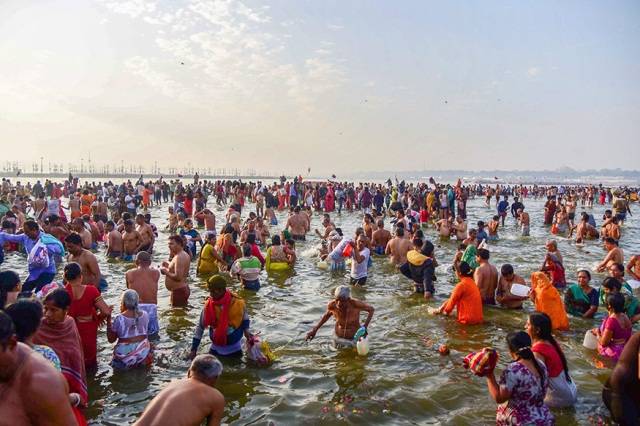
Devotees across the country are celebrating Maha Shivratri today, worshipping Lord Shiva, also known as the 'destroyer of evil'.
Since the break of the dawn, long queues of devotees are seen at many temples of Lord Shiva. Devotees are offering bael leaves, milk and honey to 'Shivling' and chant the name of Lord Shiva.
Adding to it, the Sangam, confluence of the Ganga, Yamuna and the mythical Saraswati, is also all set to witness the last dip of the Kumbh Mela today.
Interestingly, more than 22 crore devotees took a holy bath here. Gunjan Varshney, President of Ram Naam Bank, told PTI, "This day symbolises the last holy bath of the Kalpvasis and is directly related to Lord Shiva. As per the mythology, this day is awaited in the heavens as well."
She said it was on this day that Lord Shiva got married, and therefore is eagerly awaited by his followers, who worship him.
Ashutosh Varshney of Grah Nakshtram, who has set up his camp here, said, "Mahashivratri marks the culmination of the Kumbh and the prominent bathing days. And this time Mahashivratri is falling on a Monday the day dedicated to Lord Shiva, which is falling after a long time."
He also said 'Rudrabhishek' of 'shivling' is also done on this day. In the Kumbh held in Sangam city, there were six bathing dates. "Of these, shahi snaans were held on occasions of Makar Sankranti (January 15), Mauni Amawasya (February 4) and Basant Panchami (February 10).
Varshney added, "Apart from this, 'parv snaans have been held on the occasion of Paush Poornima (January 21) and Maghi Poornima (February 19)."
Kumbh Mela is one of the largest religious gatherings in the world, held in Uttar Pradesh's Allahabad from January 15 on Makar Sakranti to March 4 this year. The 55-day long Kumbh ends on this day.
Maha Shivratri is considered auspicious for spiritual growth and is celebrated with immense by devotees of Lord Shiva.
As per Hindu almanac, Maha Shivratri is celebrated on the 13th night and the 14th day of the Phalguna month (somewhere in February and March). The festival, also known as 'the great night of Shiva', celebrates the overcoming of darkness, ignorance and also marks the beginning of spring.
















